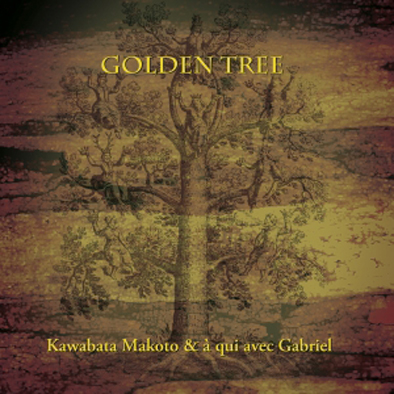Kawabata Makoto and à qui avec Gabriel, "Golden Tree"
 There is no denying that Kawabata Makoto is an uncompromising and unique artist, but the sheer volume and unbridled excess of his work as Acid Mothers Temple has been yielding diminishing returns for me for quite some time.  Consequently, I always look forward to his more experimental and intimate diversions, such as this uneasy, drone-heavy collaboration with enigmatic Japanese accordionist à qui avec Gabriel. The two musicians make an inspired and complementary pairing, but Golden Tree does not entirely avoid some of Makoto's more irksome tendencies.
There is no denying that Kawabata Makoto is an uncompromising and unique artist, but the sheer volume and unbridled excess of his work as Acid Mothers Temple has been yielding diminishing returns for me for quite some time.  Consequently, I always look forward to his more experimental and intimate diversions, such as this uneasy, drone-heavy collaboration with enigmatic Japanese accordionist à qui avec Gabriel. The two musicians make an inspired and complementary pairing, but Golden Tree does not entirely avoid some of Makoto's more irksome tendencies.
Kawabata's greatest strengths have always been spontaneity, enthusiasm, imagination, and his very free, "anything goes" approach to his music, so it is no surprise that Golden Tree's three pieces sound like improvisations rather than compositions.  Thankfully, he and à qui avec Gabriel seem to have quite a comfortable chemistry, even if it sometimes veers into somewhat risky and puzzling territory as the album unfolds.  The two certainly have no misgivings about lingering in the precariously no-man's land between "self-indulgent" and "boldly innovative."
The album's first piece, "A Sacred Tree at Nemi," however, plays things relatively straight, embellishing the abstract moans and shimmering drones of Makoto's guitar with sustained accordion swells and à qui avec Gabriel's ghostly, ritualistic-sounding vocals.  It is an excellent piece, but it does not stray terribly far from the established drone template, aside from its subtly uncomfortable dissonance.
The proceedings get significantly weirder during the epic, 35-minute centerpiece, "Solid Torus," which starts off in pointillist, lurching fashion before plunging into its long, strange trajectory in earnest.  Even after several listens, I still do not know quite what to make of it.  I can definitely say that it is bloated, schizophrenic, and meandering though.  And that Makoto and his foil sometimes seem to be playing two very different songs.  As unpromising as that might sound, however, it ends up being perversely compelling and definitely seems deliberate rather than accidental.
For her part, à avec qui Gabriel's playing is often surprisingly straightforward and melodic, but it sounds tense and unnerving when coupled with Kawabata's subtly ugly and shrill bed of dissonantly clashing drones.  The overall effect is like a somewhat unhappy accordionist grudgingly attempting to serenade young lovers outside a Parisian cafe, but being nearly drowned out by someone blasting a Birchville Cat Motel record next door.  I can honestly say that I have not experienced anything quite like that before, so the piece is ultimately successful despite its flaws.
The duo save their most unqualified triumph for last, however.  The evocatively titled "A Priest of Nothingness Under the Moon" is deceptively simple, yet remarkably effective.  It is essentially built upon a very minimal, fragile, and endlessly repeating plucked guitar motif and not much else, but its nagging insistence holds the piece together beautifully amidst the unfolding melancholy accordion improvisations and anguished guitar moans and howls.  I have no idea how Makoto managed to get some of these sounds, as he is only credited with guitar and it sometimes sounds like someone viciously bowing a distorted cello–it gets pretty visceral.  Also, à avec qui Gabriel's intermittent angelic vocals are harshly distorted in a very appealing way.
Ending the album on such a focused, cathartic, and emotionally resonant note necessarily makes the other pieces seem comparatively a bit baggy and wandering, but such a crescendo makes for a very satisfying album sequence-wise.  Also, there is no way "Priest" would have had the same impact if the preceding 45-minutes had been similarly raw, so I have to conclude that Kawabata and his mysterious accordionist friend knew exactly what they were doing, even if they took a sometimes puzzling route getting to their destination.  Golden Tree occasionally seems to overstay its welcome or have trouble finding its way at various points, but it ultimately coheres into quite a fine and unusual whole.
Samples:
 



